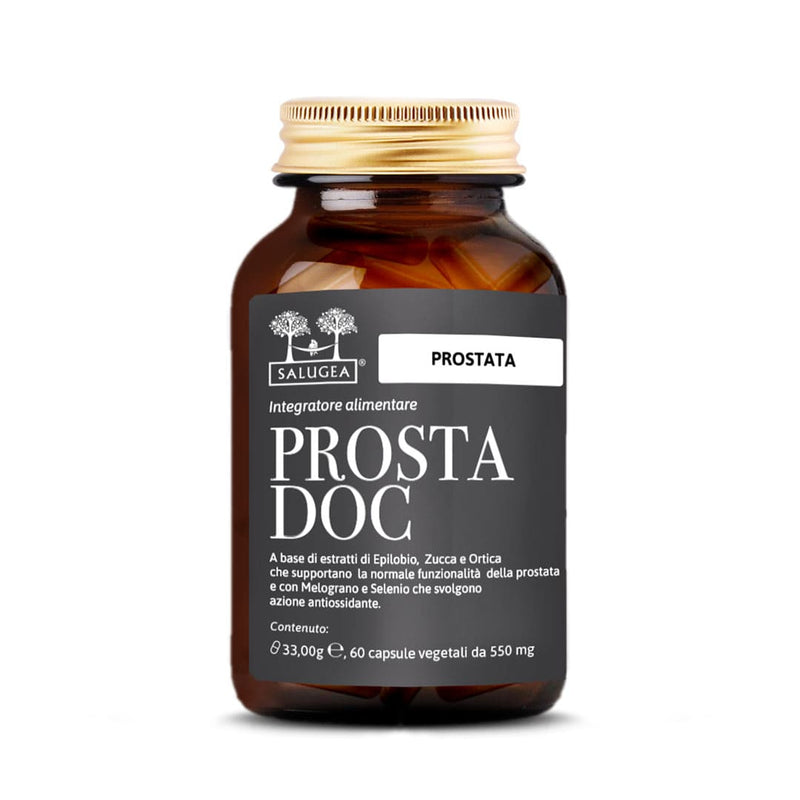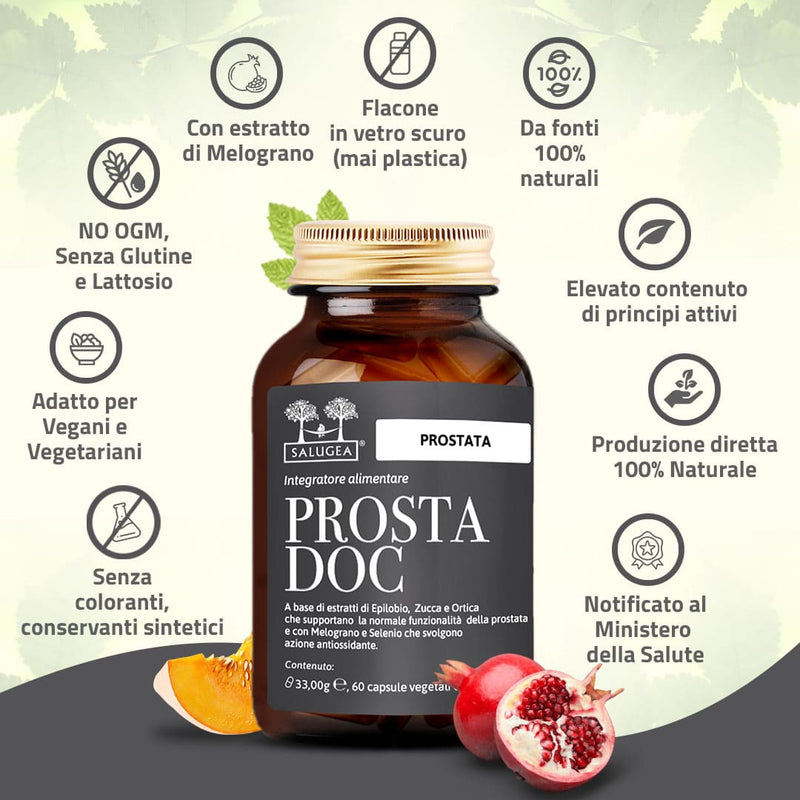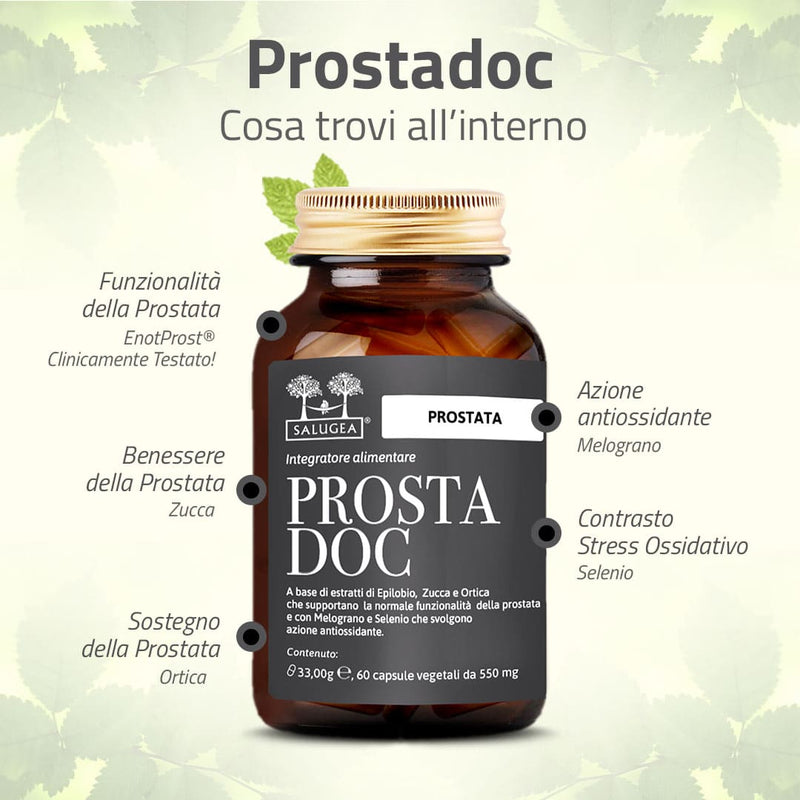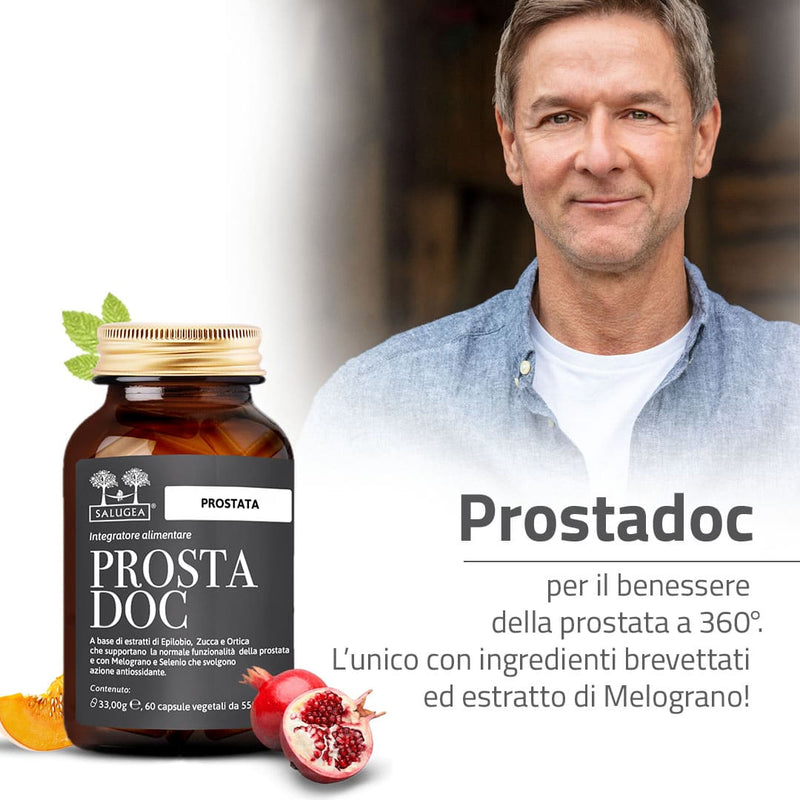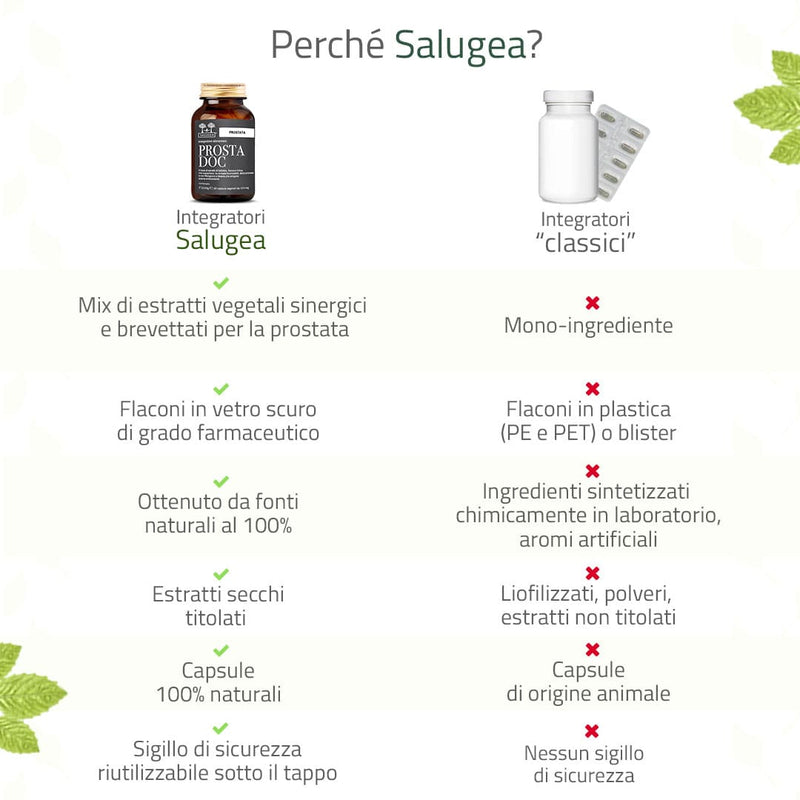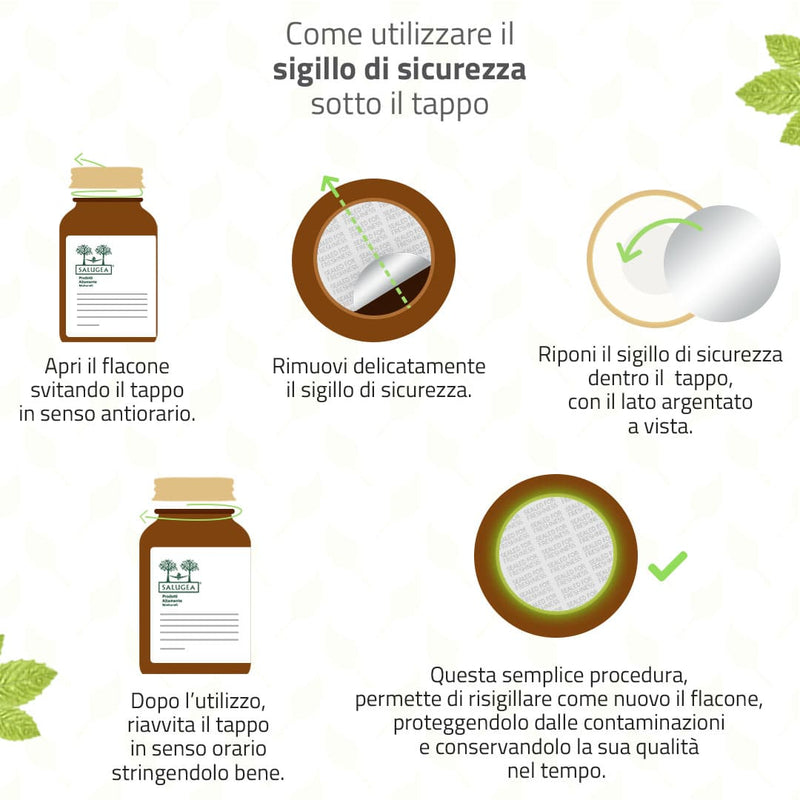- 1 - Who is it for
- 2 - How to take
- 3 - Ingredients
- 4 - Frequently Asked Questions
Prostate Natural Supplement
Prostadoc is Salugea's supplement specifically designed to support prostate functions.
By normalising urination frequency, nocturnal awakenings become fewer, you can take a ride on your bike with no worries, and in general you feel comfortable and at ease in any place and any situation whatsoever. No need for restrooms nearby because of possible urine losses.
No colourings, preservatives or sweeteners.
Unlike single-ingredient products, Salugea Prostadoc contains a mix of specific and synergistic vegetable ingredients supporting the prostate physiological functions: EnotProst®, a patented mix of herbal extracts, Pumpkin, Nettle, Pomegranate and Selenium extracts.
To date, Prostadoc is the only food supplement for prostate that includes Pomegranate dry extracts in its formulation!
Because of its unique combination of vegetable ingredients, Prostadoc is an innovative and high-quality supplement.
- Innovative because of its unique formulation. EnotProst® is a patented extract of Epilobium. Clinical studies have proved the efficacy of Epilobium on prostate-related conditions. Pomegranate is an absolute novelty in the prostate supplement world. In fact, it has shown a remarkable efficacy both in prevention and in early-response phases*.
- Quality because it contains only titrated dry extracts and capsules are packed in brown glass bottles. For greater effectiveness, we only use the plant active principles, naturally and safely preserved over time in brown glass bottles.
*See Experimental Phytotherapy
Who it is for
Prostadoc is ideal for men who:
- want a 360-degree solution to prostate discomfort,
- feel the urge to frequently urinate, especially at night,
- avoid cycling because of fear of discomfort,
- do not go out because they dread urine leakage and need to always have restrooms nearby,
- experience stress and discomfort during intimacy with their partner.
What results you obtain with Prostadoc
Thanks to Prostadoc 100% natural vegetable dry extracts:
- you finally have a 360-degree solution to prostate discomfort,
- your night sleep will no longer be disrupted by a frequent and sudden urge to urinate,
- you will enjoy riding your bike again, feeling at last comfortable and safe,
- you counteract oxidative stress,
- you feel at ease anywhere,
- and finally, you will enjoy intimacy with your partner to the full.
Why is Prostadoc different from any other natural supplements for the prostate?
- It is packed in brown glass pharmaceutical bottles. Glass is the only material that can guarantee the quality and safety of the product over time, and it is good for the environment!
- It comes in acid-resistant capsules allowing the ingredients to safely go through the gastric barrier and reach the intestines without being broken down by digestive acids.
- It is 100%natural.
- To date, it is the only prostate natural supplement that also contains Pomegranate extracts!
- It is a mix (and not a single ingredient!) of specific and patented plant extracts of proven efficacy on prostate disorders.
- Its active ingredients have proved to be effective not only in prevention, but also in early-response phases.
- It is suitable for both vegans and vegetarians.
- It is gluten free.
How it works
The secret of Prostadoc lies in its 100% natural formulation in which every active ingredient works towards ensuring the prostate natural functions.
EnotProst®, Epilobium to support the prostate physiological functions.
EnotProst® is a patented Epilobium dry extract titrated in Enotein B. The fact that EnotProst® is a patented ingredient is extremely important from a consumer’s point of view. In fact, the patent ensures that each active principle has been carefully studied and made the object of clinical studies that have proved its efficacy.
Epilobium is a plant that has long been used to support prostate natural functions.
Pumpkin, rich in trace elements and minerals beneficial for the prostate.
Pumpkin seeds are rich in trace elements, minerals (selenium, iron, magnesium, phosphorus), Omega 3 in the form of fatty acids and phytosterols.
This mix of active ingredients proves to be effective to support the prostate natural functions over time.
Nettle, for the men's hormone balance.
Despite being mostly known for its stinging effects, Nettle boasts several fantastic properties!
One of these has been proved to be extremely beneficial to the prostate. Nettle root, in particular, is rich in phytosterols (β-sitosterol, daucosterol, and relevant glucosides) and scopoletin that support the man's hormone balance and prostate functions.
Pomegranate, for its antioxidative action.
Pomegranate has been known since ancient times. In the Old Testament, Solomon refers to it as the plant of the Promised Land, while Carthaginians used to grow it especially for its fruits, considered as a fertility symbol.
The fruit of pomegranate is very rich in antioxidants that benefit the whole body and hence also the prostate. Several clinical studies have proved the efficacy of the Pomegranate many properties on prostate. Please refer to the Experimental Phytotherapy section.
To date, Prostadoc is the only food supplement for prostate that includes Pomegranate dry extracts in its formulation!
Selenium, to counteract oxidative stress.
Selenium is an essential trace nutrient that neutralises free radicals and protects the body cells from the ill-famed oxidative stress.
Besides, research has confirmed that Selenium is really beneficial for the prostate. Please refer to the Experimental Phytotherapy section.
For maximum benefits, we recommend that you take two capsules of Prostadoc a day.
Please follow the instructions hereunder:
- mid-morning, preferably on an empty stomach*: 1 capsule of Prostadoc,
- mid-afternoon, preferably on an empty stomach*: 1 capsule of Prostadoc.
*By "empty stomach" we mean at least one hour before or after each main meal.
Please Note. Prostadoc comes in acid-resistant capsules that ensure a complete protection of the active ingredients from gastric degradation, thereby maximizing their absorption and, hence, their effectiveness.
Duration of treatment with Prostadoc
Prostadoc is fast-effective, and you will feel the benefits already after a few doses.
We recommend that you continue the treatment for at least three months so as to stabilize the results obtained.
At the end of the treatment contact us! We care for you and wish to know how you got on. You will have the opportunity to share your results with our team of Experts and receive advice on how to carry on with the treatment to maintain or improve the results you have achieved.
DISCLAIMER
As we are all different (and unique!), the dosage can be set according to your specific needs and requirements. Just give us a call or write to us for any kind of information or advice you may require. Our experts shall remain at your fullest disposal ;)
Prostadoc alone will give you excellent results. But for a stronger and deeper action, you may want to combine it with:
- Salugea Organic Pomegranate Juice to increase your daily intake of antioxidants,
- Salugea Organic Cranberry Juice beneficial for the urinary tract,
- Salugea Sanuril Formula Potenziata for an even more specific action on the urinary tract,
- Salugea Glutatione Forte for its specific antioxidative action. If taken with Prostadoc, Glutatione Forte daily dosage should be of one capsule a day (instead of two).
WARNINGS
Supplements cannot be considered as a replacement for healthy diet and lifestyle. Keep out of reach of children under the age of three. Do not exceed the recommended daily dosage. The expiry date refers to the product intact, stored in a cool and dry place, away from heat and direct sunlight.
EnotProst®: Epilobium (Epilobium angustifolium L.) aerial parts d.e., titr. to15% oenothein B (origin: Italy), acid-resistant capsule (coating agent: Hydroxypropylmethylcellulose; gelling agent: gellan gum), Pumpkin (Cucurbita pepo L. var. oleifera Pietsch) seed d.e. titr. to 40% fatty acids – 0.075% phytosterols, Nettle (Urtica dioica L.) root d.e. titr. to 0.8% beta-sitosterol, Pomegranate (Punica granatum L.) fruit d.e. titr. to 40% punicosides, Selenium L-Methionine, Anti-caking agents: vegetable magnesium stearate; bamboo sprout-derived silica. Dry extracts are supported on maltodextrins.
Nutritional Values
|
AVERAGE INTAKE OF NUTRIENTS AND VEGETABLE EXTRACTS PER DAILY DOSE (2 Capsules) |
|||
|
EnotProst® |
500 mg |
||
|
of which Enotein B |
75 mg |
||
|
Pumpkin d.e. |
150 mg |
||
|
of which fatty acids |
60 mg |
||
|
of which Phytosterols |
0,1 mg |
||
|
Nettle d.e. |
130 mg |
||
|
of which Betasitosterol |
1 mg |
||
|
Pomegranate d.e. |
100 mg |
||
|
of which Punicosides |
40 mg |
||
|
Selenium |
70 µg |
127% NRV |
|
|
NRV: Nutrient Reference Values |
|||
Experimental Phytotherapy
The prostate is a male small gland located under the bladder.
It has many important functions but, unfortunately, in most cases, it is never checked until some discomfort appears.
And this is not a good thing!
Prostate disorders in men are considered among the most common urological problems.
Benign Prostatic Hypertrophy (BPH) is the second most common health problem diagnosed in men aged 50 years of age and over.
A study, conducted in Italy in 2009, revealed that BHP incidence increases with age, whilst it decreases in men aged 85 and over: 0.6% (35-44 years), 4.7% (45-54 years), 20.3% (55-64 years), 37.5% (65-74 years), 42.9% (75-84 years), and 37.5% (≥85 years)1.
BPH is characterized by an increase in volume of the prostate gland. The enlarged prostate crowds the urethra, causing it to narrow, while the bladder walls thicken and the flow of urine out of the bladder is blocked or diminished.
Urethral narrowing can lead to Acute Urinary Retention (AUR) and Chronic Urinary Retention (CUR). Both can lead to infection and cause bladder stones, hematuria (blood in urine), damage to the bladder walls and to the kidneys.
The most common symptoms of BPH include the inability to completely empty the bladder, increased frequency of urination at night (nocturia), weak urine stream, incontinence (sudden, uncontrollable urges to urinate), difficulty starting urination.
What can be the causes for an enlarged prostate? Mostly unknown, still.
An inflammatory state and hormonal imbalance, both related to ageing, might be the explanation.
And what are the natural solutions available on the market?
Mainly single-ingredient food supplements.
Yet, the single-ingredient approach proves to have little efficacy from a functional point of view.
In fact, only the synergy developed by a combination of several plant extracts can have a stronger overall impact.
Prostadoc contains a mix of specific and patented plant extracts targeted to ensure the prostate physiological functions: EnotProst®, Pumpkin, Nettle, Pomegranate and Selenium.
To date, Prostadoc is the only food supplement for prostate that includes Pomegranate dry extracts in its formulation!
Because of the combination of its specific ingredients, Prostadoc is an innovative and high-quality food supplement.
Before moving to the scientific studies section, we wish to explain the reasons behind our selection of Prostadoc active ingredients.
Most prostate natural supplements contain Serenoa repens and Zinc. Why have they not been included in Prostadoc formulation?
Serenoa
Certainly, it is the most common plant to be found in prostate supplements However, we chose to leave it out of the Prostadoc formulation for the following reasons.
- For Serenoa to be effective, its titration must be extremely high (around 85%) which can only be obtained from its seeds oil; dry extracts instead can have a maximum titration of 45%. That is why, the quantity of dry extracts needed would be such that the capsule would be totally filled with one single ingredient.
- Hence, had we chosen Serenoa, that would have been the only ingredient in Prostadoc, no room for others!
- Besides, from a functional point of view, single-ingredient supplements do not perform as well as multi-ingredient formulations. In fact, the synergy developed by a mix of different plant extracts has deeper and broader effects.
These are the main reasons why we decided to exclude this ingredient from Prostadoc formulation. But Mother Nature, as the eternal dispenser of remedies, had something else in store: Epilobium.
For Prostadoc we have selected EnotProst®, a patented extract of Epilobium. Clinical studies have revealed that Epilobium is highly effective in maintaining the prostate physiological functions.
Zinc
Zinc has not been included in Prostadoc Formulation because recent research has confirmed that zinc may be involved in the functions of some metalloproteases - enzymes that can promote inflammatory-type prostate degenerative phenomena3-4-5.
These findings are still being verified, so we decided not to include zinc in Prostadoc formulation.
We have preferred Selenium instead for its many properties and particularly its anti-oxidative action - oxidative stress being a major factor in prostatic disorders.
In the next section, we will review a number of scientific studies relevant to each plant extract.
1SIMG, 2010 - Italian Society of General Practice], with an estimated global prevalence of about 25% (2,3). 2) Harvey BS (2014) Prostate Enlargement (Benign Prostatic Hyperplasia). National Institute of Diabetes and Digestive and Kidney Diseases.
2LeeSWH, Chan EMC, Lai YK (2017) The global burden of lower urinary tract symptoms suggestive of benign prostatic hyperplasia: a systematic review and meta-analysis. Sci Rep 7(1):7984.
3BiałkowskaK, et Al. Association of zinc level and polymorphism in MMP-7 gene with prostate cancer in Polish population. PLoS One. 2018 Jul 23;13(7):e0201065. doi: 10.1371/journal.pone.0201065. PMID: 30036379; PMCID: PMC6056054.
4ParkKC, Dharmasivam M, Richardson DR. The Role of Extracellular Proteases in Tumor Progression and the Development of Innovative Metal Ion Chelators that Inhibit their Activity. Int J Mol Sci. 2020 Sep 16;21(18):6805. doi: 10.3390/ijms21186805. PMID: 32948029; PMCID: PMC7555822.
5SwansonTA, Kim SI, Myers M, Pabon A, Philibert KD, Wang M, Glucksman MJ. The role of neuropeptide processing enzymes in endocrine (prostate) cancer: EC 3.4.24.15 (EP24.15). Protein Pept Lett. 2004 Oct;11(5):471-8. doi: 10.2174/0929866043406607. PMID: 15544568.
EnotProst ®
Esposito C, Santarcangelo C, Masselli R, Buonomo G, Nicotra G, Insolia V, D'Avino M, Caruso G, Buonomo AR, Sacchi R, Sommella E, Campiglia P, Tenore GC, Daglia M. Epilobium angustifolium L. extract with high content in oenothein B on benign prostatic hyperplasia: A monocentric, randomized, double-blind, placebo-controlled clinical trial. Biomed Pharmacother. 2021 Jun;138:111414. doi: 10.1016/j.biopha.2021.111414. Epub 2021 Mar 23. PMID: 33765581.
EnotProst® was tested on 128 adult men in a double-blind clinical trial. Patients were randomly assigned to receive either EnotProst® food supplement or a placebo. The results obtained revealed that EnotProst® had positive effects on the symptoms of BPH. EnotProst® anti-inflammatory action improved the men's overall quality of life by reducing post-void residual urine volume and consequently nocturia episodes and improved overall renal function. No subjects reported adverse effects or toxicity.
Deng L, Zong W, Tao X, Liu S, Feng Z, Lin Y, Liao Z, Chen M. Evaluation of the therapeutic effect against benign prostatic hyperplasia and the active constituents from Epilobium angustifolium L. J Ethnopharmacol. 2019 Mar 25;232:1-10. doi: 10.1016/j.jep.2018.11.045. Epub 2018 Dec 5. PMID: 30529422.
The aim of this in vivo and in vitro study was to evaluate the therapeutic effect of Epilobium against BPH. The trial revealed that Epilobium exhibited a significant anti-BPH effect in vitro. The androgen level was down-regulated while the inflammatory response and oxidative stress were alleviated. Researchers concluded that Epilobium active compounds may be used as an adjuvant for treatment of BPH.
Dacrema M, Sommella E, Santarcangelo C, Bruno B, Marano MG, Insolia V, Saviano A, Campiglia P, Stornaiuolo M, Daglia M. Metabolic profiling, in vitro bioaccessibility and in vivo bioavailability of a commercial bioactive Epilobium angustifolium L. extract. Biomed Pharmacother. 2020 Nov;131:110670. doi: 10.1016/j.biopha.2020.110670. Epub 2020 Sep 4. PMID: 32896677.
This study highlights how Epilobium can be extremely effective against BPH. In particular, its polyphenols are able to reveal urolithins A and B, metabolites that are known for their anti-inflammatory activity.
Kiss A, Kowalski J, Melzig MF. Compounds from Epilobium angustifolium inhibit the specific metallopeptidases ACE, NEP and APN. Planta Med. 2004 Oct;70(10):919-23. doi: 10.1055/s-2004-832617. PMID: 15490319.
The study confirmed Epilobium's activity against metallopeptidases. Deregulation of the levels of metalloproteinases has been related to the development of BPH.
Pumpkin
Vahlensieck W, Theurer C, Pfitzer E, Patz B, Banik N, Engelmann U. Effects of pumpkin seed in men with lower urinary tract symptoms due to benign prostatic hyperplasia in the one-year, randomized, placebo-controlled GRANU study. Urol Int. 2015;94(3):286-95. doi: 10.1159/000362903. Epub 2014 Sep 5. PMID: 25196580.
A 2015 study carried out on more than 1,400 men and published in Urologia Internationalis investigated the efficacy of pumpkin seeds in men with BPH. The one-year study showed that men who supplemented their diet with pumpkin seeds reported a reduction in BPH symptoms and improved quality of life.
Leibbrand M, Siefer S, Schön C, Perrinjaquet-Moccetti T, Kompek A, Csernich A, Bucar F, Kreuter MH. Effects of an Oil-Free Hydroethanolic Pumpkin Seed Extract on Symptom Frequency and Severity in Men with Benign Prostatic Hyperplasia: A Pilot Study in Humans. J Med Food. 2019 Jun;22(6):551-559. doi: 10.1089/jmf.2018.0106. Epub 2019 Apr 24. PMID: 31017505; PMCID: PMC6590724.
The three-month study involved 60 men ingesting pumpkin seed extract. The objective was to evaluate the change in IPSS (International Prostate Symptom Score) index during the period of treatment. The study revealed that participants experienced a reduction in nocturia (nocturnal urination) and in postvoid residual urine volume.
Nettle
Safarinejad MR. Urtica dioica for treatment of benign prostatic hyperplasia: a prospective, randomized, double-blind, placebo-controlled, crossover study. J Herb Pharmacother. 2005;5(4):1-11. PMID: 16635963.
A 6-month, double-blind, placebo-controlled, comparative trial of Nettle extract with placebo was conducted in 580 patients. The study revealed that men who were administered Nettle extract reported a decrease in prostate discomfort compared with those who were given the placebo. Hence, the beneficial effects of Nettle extracts on prostate symptoms were confirmed.
Akbar Karami A, Sheikhsoleimani M, Reza Memarzadeh M, Haddadi E, Bakhshpour M, Mohammadi N, Mehdi Mirhashemi S. Urtica Dioica Root Extract on Clinical and Biochemical Parameters in Patients with Benign Prostatic Hyperplasia, Randomized Controlled Trial. Pak J Biol Sci. 2020 Jan;23(10):1338-1344. doi: 10.3923/pjbs.2020.1338.1344. PMID: 32981268.
The trial involved 60 men with BPH. 30 men were treated with a placebo and 30 with Nettle extract, over a period of 12 weeks. The trial demonstrated that subjects treated with Nettle extract experienced positive effects against BPH.
Pomegranate
Seeram NP, Adams LS, Henning SM, Niu Y, Zhang Y, Nair MG, Heber D. In vitro antiproliferative, apoptotic and antioxidant activities of punicalagin, ellagic acid and a total pomegranate tannin extract are enhanced in combination with other polyphenols as found in pomegranate juice. J Nutr Biochem. 2005 Jun;16(6):360-7. doi: 10.1016/j.jnutbio.2005.01.006. PMID: 15936648.
The in vitro study confirmed the potent antioxidant activity of Pomegranate against altered cell proliferation and inflammation.
Ming DS, Pham S, Deb S, Chin MY, Kharmate G, Adomat H, Beheshti EH, Locke J, Guns ET. Pomegranate extracts impact the androgen biosynthesis pathways in prostate cancer models in vitro and in vivo. J Steroid Biochem Mol Biol. 2014 Sep;143:19-28. doi: 10.1016/j.jsbmb.2014.02.006. Epub 2014 Feb 22. PMID: 24565566.
The study was conducted on mice to investigate the effects of Pomegranate extracts on androgen biosynthesis. The study revealed that PSA (Prostate Specific Antigen) levels were significantly decreased by the treatment with Pomegranate extracts.
Selenium
Eichholzer M, Steinbrecher A, Kaaks R, Teucher B, Linseisen J, Rohrmann S. Effects of selenium status, dietary glucosinolate intake and serum glutathione S-transferase α activity on the risk of benign prostatic hyperplasia. BJU Int. 2012 Dec;110(11 Pt C):E879-85. doi: 10.1111/j.1464-410X.2012.11383.x. Epub 2012 Aug 9. PMID: 22882569.
The study investigated the direct relationship between Selenium deficiency and higher chances of developing prostatic hyperplasia. Inflammation is one of the main causes for prostatic hyperplasia. One of the main properties of Selenium lies in its antioxidative action that reduces inflammation. Hence, a Selenium deficiency may increase the risk of BPH.
The study showed that the risk of prostatic hyperplasia decreases significantly with the increase of Selenium serum concentration.
I nostri testi hanno scopo divulgativo, non vanno intesi come indicazione di diagnosi e cura di stati patologici e non vogliono sostituirsi in alcun modo al parere del Medico.
Cod. Min. Sal.: 153518
I nostri testi hanno scopo divulgativo, non vanno intesi come indicazione di diagnosi e cura di stati patologici e non vogliono sostituirsi in alcun modo al parere del Medico.
Prostadoc
Prostate Natural Supplement
Domande Frequenti sull'integratore
Altre Domande?
Se non hai trovato la risposta alla tua domanda, puoi contattarci:

